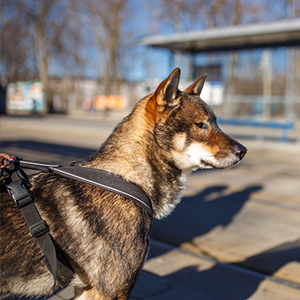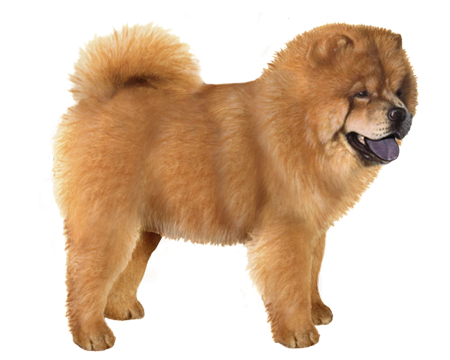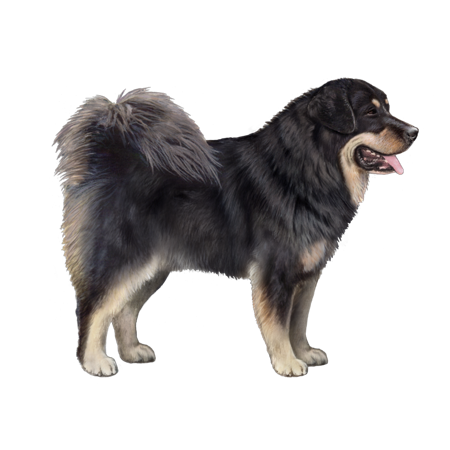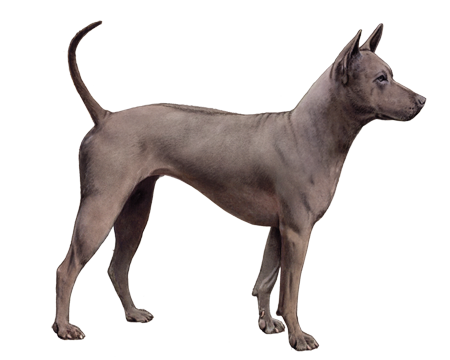
Shikoku Ken
The graceful, stoic Shikoku Ken may be standoffish with strangers and require firm training to temper guarding instincts. But this intelligent, active breed tends to be loyal and submissive to its family.
Interested in discovering if your dog is a Shikoku Ken?
Check out Wisdom Panel's DNA tests.

Shikoku Ken Traits
General Appearance
The medium-sized Shikoku Ken is compact and muscular. The breed has a thick, powerful neck, curled tail, pricked ears, and a keen, alert appearance.
Coat and Colouring
The Shikoku Ken is a double-coated dog with a soft, dense undercoat and harsh, straight outercoat. The breed comes in three colors: red, black and tan, and sesame (a mixture of red and black). In all color variations, the dogs should have "urajiro"—white or cream markings—on the underside portions of the body, legs, and cheeks.
Distinctive Physical Traits
The Shikoku Ken has several unique features. The dog's small, triangular, dark brown eyes turn up at the outer edges. Its petite, pricked ears tilt forward. And the breed's thick, high-set tail curls over the back—almost touching the hocks.
Shikoku Ken Temperament
A member of the working group, the Shikoku Ken historically hunted in the mountainous regions of Japan. As a result, the breed grew to be tough, agile, and resilient in harsh conditions.
Though submissive to their owners, Shikoku Kens are often aloof with strangers and need early socialization to subdue their predatory instincts and prevent aggression toward other dogs. The breed can be mouthy and must be watched around children. As fast learners, Shikoku Kens require firm, consistent leadership. Without it, the breed may be stubborn and relentless.
Because Shikoku Kens are vocal, they don't make the best apartment dogs. They tend to growl (not bark). And though these growls aren't usually intended to be aggressive, they can send the wrong message to both humans and dogs. As such, this breed is not a great fit for dog parks.


Shikoku Ken History
A close relative of the Shiba Inu, the Shikoku Ken is a primitive breed from Shikoku Island, Japan. Also known as Kochi Ken, Mikawa Inu, and Japanese Wolfdog, the Shikoku Ken was bred to hunt deer and boar in the mountain districts of the Kochi Prefecture of Japan. This job earned the breed the nickname "boar hound."
There were initially three varieties of the breed: Awa, Hongawa, and Hata—all named after the areas in which they were bred. Dogs in the Hata line had stockier builds, broader skulls, and thicker, longer coats. In contrast, Hongawa dogs had more elegant builds with long, strong limbs and weatherproof coats. The modern Shikoku Ken is a mix of all three lines.
Japan declared the Shikoku Ken a Natural Monument (protected species) in 1937.
Shikoku Ken Care
Nutrition
Shikoku Kens need a high-quality dog food that is appropriate for their life stage (e.g., puppy, adult, senior). Also, consider a diet formulated for medium-sized dogs. And to keep your Shikoku Ken from becoming overweight, measure out meals and give treats sparingly.
Grooming
An occasional bath and brushing are all the Shikoku Ken needs to stay clean. This breed's thick, fast-growing nails require regular trimming to avoid splitting, cracking, or becoming overgrown—which can be painful. Finally, all dogs benefit from a dental care routine that includes at-home teeth-brushing and professional dental cleanings.
Exercise
Shikoku Kens require moderate exercise—such as brisk walks, off-leash play, and games in fenced yards. Swimming, hiking, dog sports, and other high-intensity activities are also great options. And don't forget brain workouts! Hide-and-seek games and puzzle toys provide essential mental stimulation.
During outdoor activities, remember that this breed is unreliable off-leash and may never achieve reliable recall. So, look for safe, fenced areas in which to play.
Training
Both intelligent and stubborn, Shikoku Kens need firm, patient owners who are willing to commit to consistent training. The breed picks up new commands and tasks quickly. But it can be impulsive and rude without a strong foundation of obedience training. Use positive reinforcement and rewards-based methods to build a bond with your Shikoku Ken.

Breed Group
Asian and Oceanian
The Asian and Oceanian group is comprised of breeds whose origins lie in Asia, which have spread as far as Australia, the islands of the Pacific, and the Arctic. This group is possibly the most ancient of all breed groups and were bred for a variety of purposes, including guarding, hunting, and as draft dogs.
Resources
https://www.akc.org/dog-breeds/shikoku/
http://shikokuclub.com/history/
http://www.fci.be/Nomenclature/Standards/319g05-en.pdf
Reviewed 26 July 2020 by Laura Inman, DVM












































